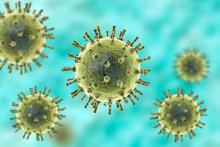Immunizations: Shingles (Herpes Zoster)

Shingles is an infection caused by the varicella-zoster virus. It’s the same virus that causes chickenpox. People who’ve had chickenpox in the past are at risk for shingles.
More than 99% of Americans born before 1980 have had chickenpox, even if they don’t remember it. After a person recovers from chickenpox, the virus stays dormant, or inactive, in their body. The virus can become active again later in life, causing shingles. The risk of shingles increases as you get older.
A vaccine can prevent shingles
The best way to prevent shingles is to get vaccinated!
Learn more about the shingles vaccine
Shingles 101
Singles is caused by the virus that causes chickenpox, the varicella-zoster virus. A person must have had chickenpox disease to develop shingles. After a person recovers from chickenpox, the virus stays in the body. Years later, the virus can become active again and cause shingles.
It isn’t known exactly why the virus is reactivated later in life. One main factor linked with getting shingles is having a weakened immune system. Your immune system protects you against infection and disease. As you age, your immune system naturally gets weaker and doesn’t fight off diseases as well. Immune systems also can be weakened from diseases or medications, such as:
- Leukemia.
- Lymphoma.
- HIV (human immunodeficiency virus) and AIDS (acquired immunodeficiency syndrome).
- Chemotherapy.
- Medications for organ and bone marrow transplants.
People who have a weakened immune system are at a greater risk of getting shingles.
Most people develop shingles only once during their lifetime. However, some people get shingles more than once.
A person with the shingles virus can give chickenpox to someone who hasn’t had chickenpox or hasn’t received the chickenpox vaccine. If you have blisters from the shingles rash, you can spread the disease until the blisters dry out. People with shingles cannot spread the virus before their rash blisters appear or after the rash dries and crusts.
To prevent spreading the virus to others:
- Cover the rash.
- Avoid touching or scratching the rash.
- Wash your hands often. Learn when and how to wash your hands.
- Avoid contact with the following people until your rash crusts:
- Pregnant women who’ve never had chickenpox or the chickenpox vaccine.
- Premature or low birth weight infants.
- People with weakened immune systems (a lowered ability to fight germs and sickness).
Symptoms can range from mild itching to severe pain. The first sign of shingles is often a tingling, itchiness, or a stabbing pain on the skin. A few days later, a painful rash begins on one side of the body or face. Most commonly, the rash occurs in a single stripe around either the left or the right side of the body.
The rash causes small blisters filled with fluid. They often look like a group of raised dots. The blisters dry out after several days. The rash from shingles usually heals within three to five weeks. In addition to the rash, shingles can cause:
- Fever
- Headache
- Chills
- Upset stomach
The most common complication of shingles is long-term nerve pain. Some patients have pain for years after the rash is gone. In rare cases, shingles can lead to other complications. These might include pneumonia, hearing problems, blindness, brain inflammation, or death.
Medicine is available to treat shingles. These medicines are most effective if you start taking them as soon as possible after the rash appears. If you think you have shingles, see a doctor right away to begin treatment.
Pain medicine, either over the counter or a prescription from your doctor, may help relieve the pain caused by shingles. Wet compresses, calamine lotion, and colloidal oatmeal baths (a lukewarm bath mixed with ground up oatmeal) may help relieve itching.
The only way to protect against shingles is to get vaccinated. The shingles vaccine (called Shingrix) is given in two doses, usually two to six months apart.
The CDC (Centers for Disease Control and Prevention ) recommends the Shingrix vaccine for:
- Adults 50 years and older.
- Adults 19 years and older who have a weakened immune system.
Children should get vaccinated against chickenpox so they have less chance of getting shingles later in life.
Find out if you’re up to date on the shingles vaccine, or if your children got the chickenpox vaccine. Check our Wisconsin Department of Health Services (DHS) Wisconsin Immunization Registry.
If you’re worried about cost, your family may be eligible for free vaccines. Read about our Vaccines For Children and Vaccines For Adults programs.
Just for health care providers
- National Institute of Health—Journal articles
- CDC recommendation from the Advisory Committee on Immunization Practices (ACIP)—Zoster (Shingles) ACIP Vaccine Recommendations
